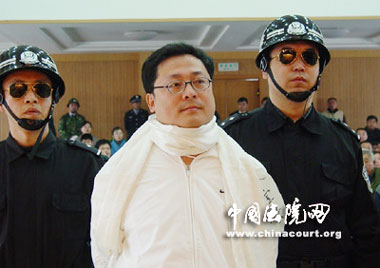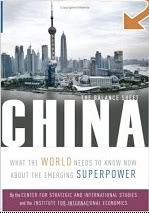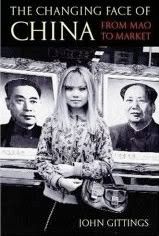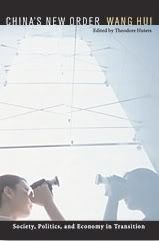China: More rights for millionaires
 Mar 22, 2007
Mar 22, 2007By Pallavi Aiyar
BEIJING - After years of galloping economic growth in China, the ruling Chinese Communist Party (CCP) has much to celebrate. However, the growth has come at a cost, and rather than strengthening the party's hand to press ahead with further economic reforms, growing inequalities, rampant corruption and vanishing provisions for health care and education have put China's leadership in somewhat of a tight spot.
Increasingly squeezed between the demands of the right and the criticisms of the left, the CCP is engaged in an ever more delicate juggling act, balancing the interests of the urban middle class, who have emerged as a key constituency of support, and a restive peasantry, once the party's mainstay but progressively disaffected at being left behind by the economic boom in the cities.
China's unique form of "socialism with Chinese characteristics" is rent with contradictions, and many of these are forcibly coming to the fore. The recently concluded annual session of China's parliament, the National People's Congress (NPC), usually a sedate piece of set political theater, was thus the site of some unusually feisty debate this year.
The main bone of contention was a landmark bill providing the legal basis for the protection of private property for the first time since the CCP came to power in 1949. The NPC has never voted against a bill proposed by the government and, as expected, the close to 3,000 delegates approved the property-rights bill. However, its passage was atypically rocky, requiring the government to answer some fierce criticisms from an increasingly vocal cohort of new-left thinkers.
The bill took 14 years in the drafting and was subject to a record seven readings by legislators since being tabled in 2002 (most bills in China are passed after three readings). It was in fact scheduled to be passed a year ago, but widespread objections amplified by heated Internet-circulated commentaries forced its last-minute withdrawal from the parliament's agenda. One of the bill's most vocal critics, a law professor at Peking University, Gong Xiantian, condemned it as "copying capitalist law like slaves" and offering equal protection to "a rich man's car and a beggar man's stick".
For the left, the bill represented a final sellout by the state to capitalist interests. China has already embraced several other free-market mechanisms such as stock markets, but the idea that socialist property is inviolable has long been an almost scared legal principle in China. The debate about property rights thus goes to the core of China's modern identity.
"Socialism is based on public ownership. This won't be a glorious page in the history of Chinese legislation," Gong Xiantian said of the property bill at the start of this year's parliamentary session.
The fact that the government threw its support behind the bill despite the sharp and often public critiques the draft law provoked reflects awareness of the increasing weight of the private sector in the country's economy as well as the importance of the support of a property-owning urban middle class to the party's continuing reign.
Until 1998, state-owned firms were the mainstay of the economy, but today private businesses account for more than 65% of gross domestic product and more than 80% of economic growth, according to a recent report by the All-China Federation of Industry and Commerce (ACFIC).
This buoyancy of the private sector followed policies instituted first by Deng Xiaoping, the architect of China's economic reforms, and carried on by Jiang Zemin, his successor as China's ultimate leader. Both had decided that real and rapid growth could only come about by unfettering the private sector.
Deng called economic development "hard truth", and under Jiang the restructuring of state-owned enterprises was accelerated, leading to more than 20 million workers being laid off in a huge wave of closures, mergers and privatizations that halved their number since the mid-1990s.
It was also because of Jiang's efforts that in 2002 the party threw open its doors to private entrepreneurs. According to ACFIC, almost a third of entrepreneurs who registered their businesses after 2001 are now CCP members.
For President Hu Jintao and Premier Wen Jiabao, who inherited the country's leadership in late 2002, the contradictions of China's special brand of state-led capitalism are, however, becoming ever more apparent.
In the span of some 25 years, China has gone from being one of the world's most equal, albeit poor, societies to becoming the fourth-largest economy in the world, with one of the worst rich-poor imbalances. China's Gini Index - a commonly used statistical measure of inequality where 0 represents perfect equality and 1 perfect inequality - of 0.447 is worse even than India's 0.325, according to the United Nations' 2005 Human Development Report.
Property that used to be taken away from the rich for redistribution to the poor is today routinely taken away from poor farmers and given to real-estate developers. According to the Ministry of Public Security, in 2005 there were 87,000 mass protests across the country expressing public anger. Some were directed against official corruption and unpaid wages and pensions, but most were against illegal land grabs. The number of such protests has seen a more than 400% increase over the past decade.
Given this situation, both the policies and rhetoric of the Hu-Wen duo have taken a swing leftward. The leadership has thus made tackling the income inequalities between China's rich urban and poor rural areas the centerpiece of their new five-year plan, borrowing language from the past in promising to build a "new socialist countryside". Both at the NPC and in speeches elsewhere, Wen has repeatedly stressed that "social justice" is as important a goal for China as economic growth.
The government has raised spending for rural health care and education sharply for two successive years. At this year's NPC session, Wen said in his opening address that tuition and other fees for all rural students would be eliminated, helping some 150 million families. He added that the government would step up spending on rural primary and middle schools by 21%, to the equivalent of US$29 billion.
The premier also promised greater central-government support for health care in rural areas, where 90% of the population has no health insurance. He said a trial cooperative medical-care system would be extended to cover 80% of China's territory, with the government more than doubling subsidies to $1.31 billion.
Crucially, however, Wen made no reference at all in his address to the most controversial item on the NPC's agenda: the property law.
The property bill was introduced to the NPC two days after the opening session of the parliament. In his explanation of the CCP's support of the bill, an NPC vice chairman, Wang Zhaoguo, told gathered parliamentarians that given China's current economic circumstances, the people "urgently require effective protection of their own lawful property accumulated through hard work".
The final shape that the draft law took was patently the result of an attempt to stitch up a compromise between the bill's detractors and supporters and aimed at striking a balance between state and private interests. The bill clearly laid out definitions of both and also defined private wealth, including income, houses, investments and other personal assets.
However, it stopped far short of moving toward privatizing collectively owned rural land. Instead, it maintained the concept that property is owned publicly, and individuals are merely given a right to use that property. It's that right of use that the law protects, not private ownership of land.
In a further accommodation to new-left criticisms, the bill affirmed the state-owned sector as the "leading force". "The nation is in the first stage of socialism and should stick to the basic economic system in which public ownership predominates, co-existing with other kinds of ownership," it read.
But this watered-down version may have fallen short of satisfying either side of the debate.
"Private property is the foundation of civilization. It must be protected," said Dean Peng, a Beijing-based free-market advocate and commentator. "Public ownership results in poverty, as China has already experienced."
Peng was skeptical, however, that the new law will substantially help push forward the economic-reform process. The actual impact of the law is likely to be minimal, he said, because it merely restates what was already the status quo. In rural areas, farmers have the right to lease collectively owned land for 30-odd years but cannot buy or sell it. In urban areas, residents have been able to buy and sell 50-to-70-year leases on property for well over a decade.
Peng pointed out that several laws governing the leasing of land in both rural and urban areas were already in place. The new law does not alter these but rather brings them together under a single overarching law. This might be argued to give them additional weight, but Peng was nonetheless dismissive. "We already have enough laws on paper to protect property rights. What we need is rule of law, so that these laws can really be implemented," he said.
Beyond the statement of general principles and reiteration of already existent regulations, there are some new clarifications in the law, but these primarily spell out the legal position on certain points of dispute between the property-owning middle classes and real-estate developers. For example, the law has a clause that stipulates that parking spaces around highrises belong to apartment owners and not to the property developers, previously a gray area that led to numerous disputes.
Wang Zhaoguo's explanation of the bill before the NPC, however, made scant reference to the middle classes and their interests, focusing instead on those parts of the draft law that addressed concerns regarding asset stripping of state-owned factories, illegal transfers of farmland to real-estate developers by local governments, and adequate compensation for those whose lands are expropriated legally.
The law contains provisions aimed at ameliorating all of these concerns. For example, it states that if any person "causes loss of state-owned property by transferring it at a low price, illegally sharing it in conspiracy with another person, placing a charge over it without authorization, or by other means in the course of restructuring the enterprise", he or she will bear legal liability.
It also explicitly gives farmers the right to renew their land-use leases after they expire.
However, Professor Wen Tiejun, dean of the School of Agriculture and Rural Development at Renmin University and a leading new-left scholar, remained unconvinced by these claims. "The law is dressed up to show that it will protect rural people and public-owned property, but in fact its main aim is to give more rights to China's new millionaires and urban middle class," he said.
Putting private property on an equal legal footing with that of state-owned and collective property, Wen Tiejun argued, was a dangerous first step toward the eventual privatization of all property in China, an outcome he said would be a disaster for the 700 million Chinese who continue to live in rural areas.
Rural residents have no state-provided social security, Wen explained, so that their communally owned plot of land is often virtually all that remains between them and destitution. Were they allowed to sell this land, it would expose them to exploitation and impoverishment on an altogether more alarming scale than at present, he concluded.
His solution for preventing illegal sale of farmland is to slow down the rate of urbanization. The only point where he agreed with free-market advocate Dean Peng was that laws in China had only a limited impact given the shortcomings of the legal system. "Merely formulating new laws will not change the situation on the ground," he said.
What is evident is that while the property bill may have been passed into law, the tensions within Chinese society it exposed continue to simmer.
China's current leadership has come in for criticism for what some analysts see as its weakness and ensuing inability to take a firm stand. Unlike Jiang, it is indeed hard to classify Hu and Wen as either decidedly pro-left or pro-reform. Their strategy has instead been to develop a more left-oriented rhetoric while simultaneously but quietly pushing along the reform agenda.
On the other hand, their penchant for compromise could also be interpreted as a maturing of the political system in China in which the leadership must take into account and attempt to reconcile opposing interests and views. Moving ahead through consensus rather than heavy-handed, untrammeled diktats from the top is more the style of a democracy. China's one-party system remains far from democratic in the Western liberal sense, but it is showing some signs of greater internal debate.
The course of China's development is thus likely to remain the subject of contention, but in the short term at least the country looks set to continue its embrace of pragmatism over ideology. The voices from the left might be getting louder, but so far there are scant indications that China will take a major swerve off the path of economic reform.***
Pallavi Aiyar is the China correspondent for The Hindu.
Link




0 Comments:
Post a Comment
Subscribe to Post Comments [Atom]
<< Home